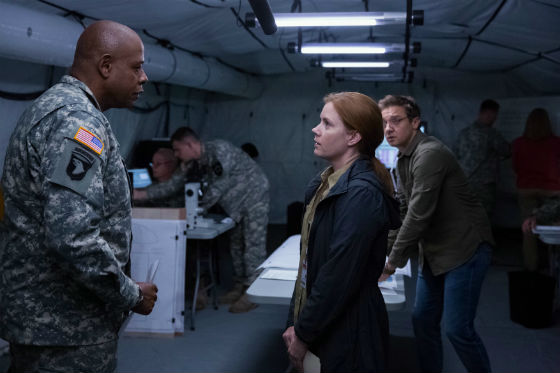Arrival

(L-R) Forest Whitaker, Amy Adams and Jeremy Renner in Denis Villeneuve's ARRIVAL.

Adapted for the screen from Story of Your Life by Ted Chiang, the first shot of Denis Villeneuve’s ARRIVAL telegraphs the outcome in a way that’s visually stunning, even emotionally grabbing, yet narratively third rate.
University linguist Dr. Louise Banks (Amy Adams) is brought onto a team to decipher the language of an alien race that has positioned 12 spacecraft in various locations around the world. I commend the screenwriter, Eric Heisserer, for not placing the spaceships in direct proximity to tourist attractions.
The story centers around the team of scientists, including Dr. Banks and theoretical physicist Ian Donnelly (Jeremy Renner), attempting to establish communications with the aliens. She discovers that writing, rather than speech, may crack the cipher. The reasoning makes sense in the moment: they can demonstrate actions and show the writing, and probably reproduce the writing easier than they can the speech. But this begins a series of gaps that undermine the narrative.
Bradford Young’s (SELMA) cinematography tells part of the story before we know it. Shallow depth of field is reversed, focusing on backdrops instead of subjects. It foretells in two ways I won’t spoil, only to say that the lens through which we see others is just as important as the lens through which we see ourselves.
The aliens are gargantuan heptapods whose speech sounds like the amplified bellow of iron pipes in an antique house. They’re surrounded by a gaseous mist, thought to be their atmosphere though it likely is much more. Dr. Banks makes significant progress communicating with the heptapods, discovering that time is absent from their syntax. They perceive time all at once, rather than a linear series of events. Their aperception affects also how certain words come across to Dr. Banks and Dr. Donnelly, as well as the 11 other teams studying them.
This leads to the film’s central conflict. Chinese General Shang (Tzi Ma) announces that they want to exchange weapons technology, and this leads to a serious misunderstanding of the aliens intent. To illustrate why, think of the idiomatic meaning of the word “weapon” when we describe knowledge. The phrase “death process” may mean “killing”, or it could mean “dying”.
But it’s at the edge of this intensely fascinating intellectual problem that the film errs. We sense that the aliens need to know that humans can work together; perhaps this is all a test? But Villeneuve and his writer leave a number of loose ends without explanation. Why, if the point is about cooperation, does the story take place exclusively from one team’s point of view (as usual, the Americans)? How does miming with symbols work faster than miming with words? If a computer can be taught to reproduce the nuances of their complex script, can’t it learn to reproduce their speech as well? Don’t the humans understand that if the aliens actually wanted to destroy them they’d have done so? Why attempt to destroy the contact between the aliens and the one team that seems to be making headway? How can humans possibly comprehend anything about fifth-dimensional beings?
These all seem like elementary problems easily resolved for a film that aspires as highly as ARRIVAL does. Adding insult to injury, Forest Whitaker’s talents are wasted as the curt Colonel Weber. He’s the Black Movie Colonel who doesn’t trust the very experts whose aid his mission is entirely dependent upon. The Chinese are potrayed yet again in film as militaristic blowhards; contrast this with the Asian scientists in THE MARTIAN. And finally, for a highly intellectual film it concludes on both a preposterous deus ex as well as a depressingly sentimental coda worthy of a Ron Howard picture, asking us to empathize with barely an outline of a character. I understand the source material, but here’s one case where cinematically there’s a more interesting human story in the working relationship between Renner and Adams, who both acted beautifully. It’s not a bad flick. However, for a film about resolving communication gaps, ARRIVAL creates too many of them.